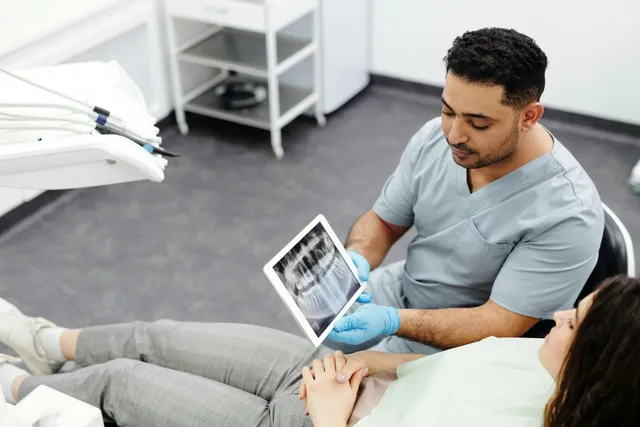Dental implants have revolutionized restorative dentistry, offering patients a durable solution for missing teeth. However, the success of dental implants over time is not solely dependent on the implant’s design or material. Effective biofilm management plays a crucial role in ensuring the longevity and functionality of implants. Biofilm, a sticky layer of bacteria that forms on implant surfaces, is a major contributor to peri-implantitis, an infection that can lead to implant failure. By focusing on biofilm management, both patients and dental professionals can significantly enhance the long-term success of dental implants.
In this article, we’ll explore how biofilm forms on dental implants, the risks associated with biofilm accumulation, and strategies for effective peri-implantitis prevention through proper oral hygiene and clinical management.
Understanding Biofilm and Its Impact on Dental Implants
What is Biofilm?
Biofilm is a cluster of bacteria and other microorganisms that adhere to surfaces, such as the surface of dental implants, creating a protective matrix that shields the bacteria from the body’s immune response and antibiotics. It is a natural occurrence in the oral cavity, but when it forms on an implant, it can lead to significant complications if left untreated.
How Biofilm Affects Dental Implants
While biofilm is common in the mouth, it poses a particular risk to dental implants. Unlike natural teeth, implants lack the ability to repair themselves or regenerate tissue, making them more vulnerable to the consequences of bacterial accumulation. Biofilm can cause several issues:
Peri-implantitis: A common complication where inflammation of the gum tissue around the implant progresses into bone loss. Biofilm is the main cause of this infection.
Implant Failure: Left unchecked, peri-implantitis can compromise the implant’s structural integrity and lead to its failure, requiring removal and replacement.
Increased Risk of Infection: The bacteria in the biofilm produce toxins that can destroy surrounding tissues, resulting in infection that can spread if not managed promptly.
The Role of Biofilm Management in Implant Longevity
1. Peri-implantitis Prevention
The formation of biofilm on dental implants can lead to peri-implantitis, a progressive disease that causes gum recession, bone loss, and possible implant failure. Managing biofilm is crucial in preventing this condition. Effective prevention strategies include:
Regular Cleaning and Maintenance: Both professional cleaning by a dentist and at-home oral hygiene practices are essential to reduce biofilm buildup.
Antimicrobial Agents: Dentists may recommend antimicrobial mouth rinses or gels to reduce the bacterial load around implants.
Surface Modifications: Implant surface materials and coatings designed to resist biofilm formation can play a key role in reducing the risk of infection.
2. Improved Healing Post-Implantation
After the placement of a dental implant, proper biofilm management is essential for optimal healing. Without proper cleaning, the accumulation of bacteria around the implant site can lead to an infection that impedes the healing process. Good oral hygiene practices can help minimize this risk, ensuring faster and more effective healing.
3. Long-Term Success and Implant Longevity
By preventing peri-implantitis and promoting better healing, biofilm management enhances the long-term success of implants. Studies show that patients who maintain good oral hygiene and follow professional cleaning regimens experience fewer complications and a lower incidence of implant failure. By addressing biofilm early and consistently, patients can enjoy their implants for many years, sometimes even decades.
Best Practices for Biofilm Management
1. Daily Oral Hygiene
The cornerstone of biofilm management is consistent oral hygiene. Patients with dental implants should:
Brush Twice a Day: Use a soft-bristled toothbrush and a non-abrasive fluoride toothpaste to avoid scratching the implant surface while effectively removing plaque and biofilm.
Floss Daily: Special implant floss or interdental brushes can be used to clean the areas between the implant and surrounding gums.
Use an Antimicrobial Mouthwash: Rinsing with an antimicrobial solution can help reduce bacteria around the implant, supporting gum health.
2. Professional Cleanings and Monitoring
Regular professional cleanings by a dentist or hygienist are vital for peri-implantitis prevention. These cleanings involve the removal of plaque and tartar buildup from around the implant that cannot be reached with regular brushing. Additionally, dentists will monitor the health of the surrounding tissue and bone, assessing for any signs of infection or complications.
3. Customized Care for Implant Patients
Every patient’s situation is unique, and maintaining implant health requires personalized care. Dental professionals should:
Tailor Oral Hygiene Recommendations: Depending on the type of implant, its location, and the patient’s overall oral health, specific cleaning methods or tools may be recommended.
Monitor for Early Signs of Infection: Regular checkups can help identify any early signs of biofilm-induced issues, allowing for prompt intervention before the problem escalates.
4. Diet and Lifestyle Considerations
Diet plays a role in oral health, as certain foods can contribute to plaque formation. Sugary and acidic foods should be minimized to reduce the risk of plaque buildup. Smoking should also be avoided, as it impairs healing and increases the risk of peri-implantitis.
The Future of Biofilm Management in Implantology
As dental technology continues to advance, biofilm management strategies for implants are becoming increasingly sophisticated. Some exciting developments include:
Antibacterial Coatings: Ongoing research is focused on developing implant materials coated with antibacterial agents that actively resist biofilm formation, providing long-lasting protection against infection.
Laser Treatments: Laser technology is being explored for its ability to safely and effectively remove biofilm and bacteria from around implants without damaging surrounding tissues.
Smart Implants: Future implants may feature sensors that monitor the presence of bacterial biofilm and alert the patient or dentist when intervention is needed.
Biofilm management is a critical aspect of ensuring the long-term success of dental implants. By understanding the role of biofilm in implant-related complications like peri-implantitis and following proper prevention and treatment protocols, both patients and dental professionals can significantly extend the lifespan and functionality of dental implants.
Patients should adopt rigorous daily oral hygiene routines, seek regular professional care, and maintain a healthy lifestyle to manage biofilm and ensure the success of their implants. With proper biofilm management, dental implants can remain a reliable and durable solution for restoring missing teeth for many years.

